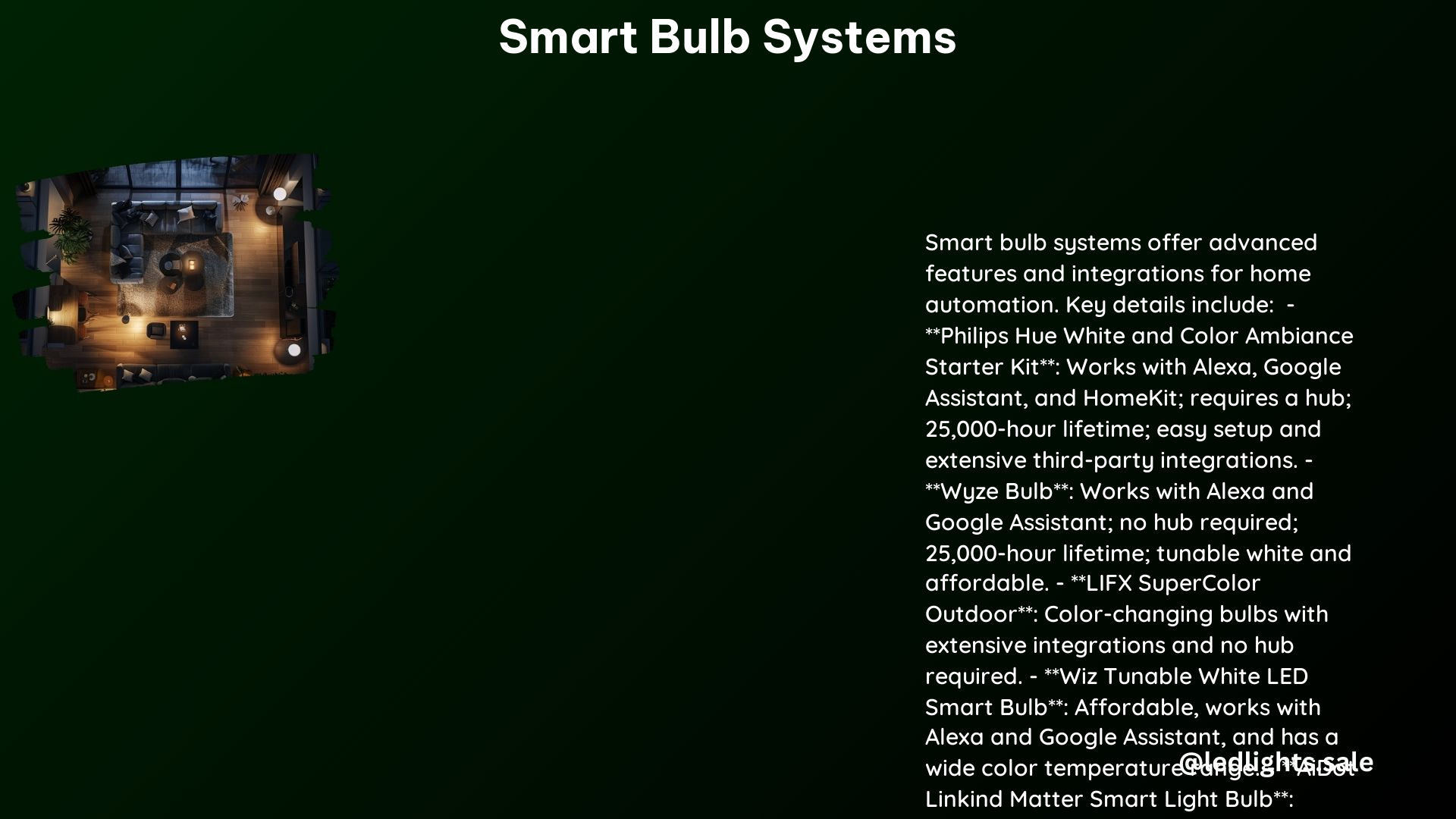Smart Bulb Systems are cutting-edge lighting solutions that seamlessly integrate technology to provide enhanced control, convenience, and energy efficiency for modern homes and businesses. This comprehensive guide delves into the intricate details of smart bulb systems, covering their interaction with traditional light switches, voice control capabilities, and the numerous benefits they offer over conventional bulbs.
Interaction with Traditional Light Switches
Smart bulbs can interact with traditional light switches in various ways, offering flexibility and compatibility for diverse home setups.
Hub-Free Operation
Some smart bulbs, such as the Wyze Bulb, do not require a dedicated hub and can be controlled directly through a mobile app or voice assistants like Alexa and Google Assistant. These bulbs typically connect to the home’s Wi-Fi network, allowing for seamless integration and control without the need for additional hardware.
Hub-Based Systems
Other smart bulb solutions, like the Philips Hue, rely on a central hub to connect the bulbs to the internet and enable communication with the accompanying mobile app and voice assistants. These hub-based systems often offer more advanced features and a wider range of customization options, making them a popular choice for more sophisticated smart home setups.
Dimmer Switch Compatibility
Certain smart bulbs, such as the Lutron Caseta In-Wall Dimmer Switch, are designed to work harmoniously with traditional dimmer switches. This allows for smooth dimming control and integration with existing lighting infrastructure, providing a seamless user experience.
Voice Control

Smart bulbs can be effortlessly controlled using voice commands, eliminating the need for a dedicated smart plug.
Voice Assistants
Many smart bulbs are compatible with leading voice assistants, including Alexa, Google Assistant, and Siri. This integration enables users to control their lighting through simple voice commands, such as turning lights on and off, adjusting brightness, and changing color settings.
Smart Home Integration
Smart bulbs can be seamlessly integrated into comprehensive smart home systems, allowing for voice control through devices like Amazon Echo or Google Home. This integration enhances the overall home automation experience, providing a centralized platform for managing various smart home devices, including lighting, security, and climate control.
Benefits Over Traditional Bulbs
Smart bulbs offer a multitude of advantages over traditional incandescent and fluorescent bulbs, making them an increasingly popular choice for modern homes and businesses.
Energy Efficiency
Smart bulbs are predominantly LED-based, which are significantly more energy-efficient than traditional bulb technologies. LED bulbs typically consume up to 80% less energy, resulting in substantial cost savings on electricity bills and a reduced environmental impact.
Convenience
Smart bulbs can be conveniently controlled through mobile apps or voice commands, eliminating the need to physically access light switches. This feature allows users to turn lights on and off, adjust brightness, and change color settings from the comfort of their couch or even while away from home.
Scheduled Lighting
Smart bulbs can be programmed to turn on and off at specific times, enabling advanced home automation and energy-saving capabilities. Users can create customized lighting schedules, ensuring that lights are only active when needed, further enhancing energy efficiency and convenience.
Color Changing
Many smart bulbs offer the ability to change the color of the light, providing a wide range of options to create the desired ambiance. From warm, cozy tones to vibrant, dynamic hues, these color-changing capabilities allow users to set the mood and transform the atmosphere of a room.
Smart Home Integration
Smart bulbs can seamlessly integrate with other smart home devices, such as security systems, climate control, and home assistants. This integration enables a centralized and coordinated approach to home automation, allowing users to manage their entire smart home ecosystem through a single platform or voice commands.
Technical Specifications
When selecting smart bulbs, it’s essential to consider the following technical specifications to ensure compatibility and optimal performance:
Lumens
The brightness of a smart bulb is measured in lumens, with a standard A19 bulb typically ranging from 800 to 1,600 lumens. Higher lumen ratings indicate brighter light output.
Color Temperature
The color temperature of a smart bulb is measured in Kelvin (K), with lower values (2,500K-3,000K) indicating a warmer, more yellowish light, and higher values (5,000K-6,500K) indicating a cooler, bluer light.
Color Changing
Many smart bulbs offer the ability to change the color of the light, often with a range of up to 16 million different color options, allowing for a wide variety of lighting effects and ambiance.
Hub Requirements
Some smart bulbs require a dedicated hub or bridge to connect to the home’s Wi-Fi network and enable communication with the accompanying mobile app and voice assistants. Others, like the Wyze Bulb, can operate without a hub.
Compatibility
It’s crucial to ensure that the smart bulbs you choose are compatible with your preferred voice assistants (Alexa, Google Assistant, Siri) and smart home platforms (Amazon Alexa, Google Home, Apple HomeKit, etc.) to ensure seamless integration and control.
By understanding the key aspects of smart bulb systems, including their interaction with traditional light switches, voice control capabilities, and the numerous benefits they offer, you can make an informed decision and enhance the lighting experience in your home or business.
